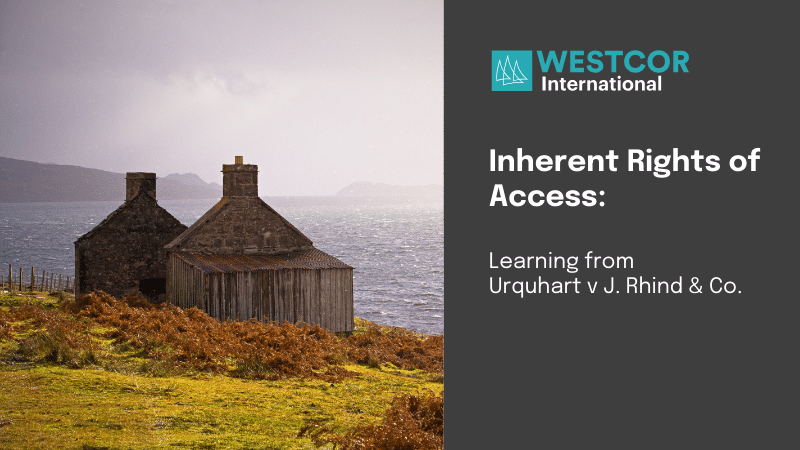Inherent Rights of Access: Learning from Urquhart v J. Rhind & Co.
In Scottish property law, establishing a servitude right of access over neighbouring land often hinges on the principle of positive prescription, which requires open, peaceable, and uninterrupted use for 20 years. However, the recent case of Urquhart v J. Rhind & Co. at Elgin Sheriff Court has highlighted important considerations regarding inherent rights of necessity, especially for properties considered enclaves.
Background
The pursuers, John Charles Urquhart, Elizabeth Rosemary Urquhart, and their daughter Marianne Elizabeth Urquhart, acquired Millie Bothy in Kinloss, a derelict salmon station on the Morayshire coast, on 31 May 2017. Their initial plan to develop holiday homes was thwarted by planning permission refusals, leading them to seek permission to redevelop the property as a personal summer home.
Millie Bothy is bounded by the foreshore to the northwest and separated from the B9089 public road by land owned by the defenders. Upon discovering the pursuers using their land for access and parking, the defenders installed locked gates without providing keys or codes, effectively blocking access.
The defenders contended that any express, implied, or inherent rights claimed by the pursuers had either prescribed or did not exist, and even if they did, they were limited to pedestrian access only. While they acknowledged that enclaves have imprescriptible inherent rights of access as per Bowers v Kennedy, they argued Millie Bothy was not landlocked due to available access via the foreshore.
In response, the pursuers sought a declarator affirming their right to pedestrian and vehicular access over the defenders’ land, based on their Land Register title, implied rights, positive prescription, or inherent necessity. They also sought an interdict and access to keys or codes for the gates.
Decision
After a thorough review of the property history, witness testimonies, and various maps and aerial photographs, the court agreed with the defenders that no right of access had been established through positive prescription. However, the court ultimately ruled that Millie Bothy was a landlocked coastal enclave, thus granting it an inherent right of necessity over the defenders’ land, though restricted to pedestrian and cart use.
Title Insurance Implications
This case highlights the nuanced nature of access rights and the importance of fact-specific analysis in determining their validity. As underwriters, we consider several factors highlighted in this case, including previous use patterns (frequency and type of use) and the conclusiveness of rights noted on the title sheet.
When assessing a property’s access route, we evaluate the condition of the road (whether it is a well-established tarmac route or an overgrown track) and the presence and history of gates. These details are crucial in assessing risk levels.
Staying informed about relevant case law and legislative changes is vital for underwriters at Westcor’s Glasgow office. This knowledge helps us evaluate the likelihood of claims and consider potential defenses and options for securing necessary rights for our insured clients. This case illustrates that even if positive prescription cannot be relied upon, alternative access routes or servitudes of necessity must be considered. Understanding the current, previous, and proposed use of the property is essential, as it directly impacts the use and burden on the servient tenement.
By remaining up-to-date and informed, we ensure a comprehensive understanding of the risks presented to us, enabling us to create effective solutions for our clients.






